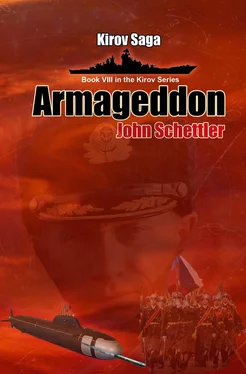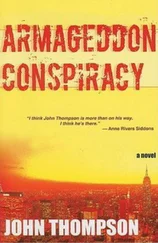John Schettler - Armageddon
Здесь есть возможность читать онлайн «John Schettler - Armageddon» весь текст электронной книги совершенно бесплатно (целиком полную версию без сокращений). В некоторых случаях можно слушать аудио, скачать через торрент в формате fb2 и присутствует краткое содержание. Жанр: Альтернативная история, на английском языке. Описание произведения, (предисловие) а так же отзывы посетителей доступны на портале библиотеки ЛибКат.
- Название:Armageddon
- Автор:
- Жанр:
- Год:неизвестен
- ISBN:нет данных
- Рейтинг книги:3 / 5. Голосов: 1
-
Избранное:Добавить в избранное
- Отзывы:
-
Ваша оценка:
- 60
- 1
- 2
- 3
- 4
- 5
Armageddon: краткое содержание, описание и аннотация
Предлагаем к чтению аннотацию, описание, краткое содержание или предисловие (зависит от того, что написал сам автор книги «Armageddon»). Если вы не нашли необходимую информацию о книге — напишите в комментариях, мы постараемся отыскать её.
Armageddon — читать онлайн бесплатно полную книгу (весь текст) целиком
Ниже представлен текст книги, разбитый по страницам. Система сохранения места последней прочитанной страницы, позволяет с удобством читать онлайн бесплатно книгу «Armageddon», без необходимости каждый раз заново искать на чём Вы остановились. Поставьте закладку, и сможете в любой момент перейти на страницу, на которой закончили чтение.
Интервал:
Закладка:
Mironov looked over his shoulder, his eyes darkly on the shadowed entrance to the stairway…the stairway the stranger had come down. The stairway Fedorov had insisted he go down again himself after he first followed the man’s footsteps that day in late June of 1908. The stairway, and the warning never to use it again…
Yet curiosity is a powerful thing. He took two more bold trips up and down those stairs, each one more harrowing than the last. There he learned of the hideous world that was coming, dark and pitiless as the soul of the man who would forge it from the steel of his own hand, Josef Stalin.
There he found another paper, this time a poster extolling the leader of the great Soviet Union-Stalin. In a moment of strange deja vu he thought he had seen that face a thousand times before-the coldness in Stalin’s eyes, the emptiness that yawned open, boundless as the night and darker than perdition. It was as if he was looking into the eyes of death itself, come to make a quiet appointment that would end his days forever. And he also learned why the statue above the city of Baku looked so familiar to him, and the meaning of the warning the stranger had whispered to him that day: ‘Do not go to St. Petersburg in 1934! Beware Stalin! Beware the month of December!’
It was then that he finally knew the meaning of the stranger’s warning, and what he had to do.
The prison was a dark and cheerless place, a place of terror, and isolation and the misery squeezed from one man after another where they huddled in the cold stone cells, behind heartless bars of iron. One man sat there, brooding, yet scheming in his mind. He had been arrested for his persistent criminal acts against the order of the state. The tall, fearsome agents of the Okhrana had tracked him down and dragged him before a court of censure, where he was lucky to have only been sentenced to 18 months in Bayil, the Black Hole of Baku.
He was born 18 December, 1878 in a little town in the Caucasus called Gori. His mother had been a simple housekeeper, his father a cobbler who often drunk himself into a stupor and beat him cruelly in the early years of his life, where the world also branded him with the scars of smallpox, and physical ailments in his feet and left arm that would plague him in later years. Yet he endured the abuse, as if he was nothing more than another piece of stone beat upon by his father, and he grew to a handsome man in his twenties.
His rebellious spirit soon found him in the activist circles and hidden meeting rooms of the incipient revolution in Russia. He read forbidden literature, the writings of men named Lenin and Marx, and soon began to agitate on their behalf. He wrote and circulated papers condemning the wealthy oil barons and bankers who had come to Baku at the edge of the Caspian Sea, and he helped organize workers strikes against them there. He joined the Bolsheviks, helped to print and spread their propaganda, and recruited new cells. He robbed the bankers he saw bleeding the country dry and used their money to foment further revolutionary activity…and he was tracked down by the Tsar’s secret police and arrested.
Now he sat in the prison of Bayil, brooding on how he might soon regain his freedom and continue with his revolutionary zeal. It was all arranged. He would feign illness so he could be taken from his cell to the infirmary, and there he would switch places with another patient being discharged, and escape. He had secretly sent messages to his comrades outside, and they would arrange a sleigh and driver to spirit him away into the cold countryside where he would travel north and east, far away from the black hole in which he now found himself. He would then change his name, assuming an alias like so many other comrades in the struggle, and he would find another cell to infect and breed the virus of revolution. The name would be a simple one, easily grasped, and rooted in the Russian word that sounded much like his old family name. He was Iosif Vissarionovich Dzhugashvili, and Dzhuga meant “Steel” in the old Georgian tongue. So he called himself by the Russian name for that word-“Stalin.”
It was all set to happen as he planned it, except for one small mishap. Three nights before he would set his plan in motion a man arrived at the gate of the prison, dressed in the dark black garb of the Okhrana. He presented his badge and papers, and was let in through the high metal doors, slowly climbing the stone steps to the warden’s office. In his hand he held an order concerning a certain prisoner, and soon the cold clap of his boots were echoing in the long stony hallway that led to the cell where Stalin slept.
The prisoner was awakened in the night, squinting up through bleary, sleepless eyes when a voice spoke from beyond the metal bars, saying his old family name, a question in the inflexion.
“Yes,” he breathed, wondering who the shadow was that had come to him in the dark of the night. The shadow was death-his own death-in the hand of a man who held a steel pistol, aiming it right at the center of the heart that would so blacken the world in decades to come. The shadow had a name as well, Sergei Mironovich Kostrikov, though he never spoke it and he wasted not another second as he squeezed the trigger and fired.
That one single act, the flexing of a finger in the night, would change the lives and fates of millions, redraw the borders of nations, and recast the entire political landscape of the world in decades to come. Was it born in Fedorov’s plaintive and desperate whisper at Mironov’s ear, and given life by his insatiable curiosity that day? Or did it spring from the hollow of Orlov’s darkened soul when he leapt from that helicopter and set Fedorov off on the long pursuit that followed. It did not matter. It was done.
Yet Mironov was not the only man to be shaken by their experience on that narrow stairway at Ilanskiy. Captain Ivan Volkov had also taken that journey and he soon learned where he was, the year and day, impossible as it seemed. After the madness passed, the cold logic of his mind perceived the opportunity at hand when his reason finally grasped the fact of his existence in the year 1908. That impossibility soon became possibility, and he knew what he would do.
He would become the hidden face in the warning Doctor Zolkin had desperately tried to hand Captain Karpov one day as the two men jousted in the sick bay aboard Kirov.
“Face it, Karpov,” Zolkin would say. “Stalin will eventually rise out of the fires of the civil war. What then? You want to face off with Stalin?”
“Don’t you understand, Zolkin? Knowledge is power too. I can know all the history as it is about to unfold. Stalin? I did some reading the other day. You want to know where Stalin is at this very moment? He’s in prison at Baku! Why, if I chose to do so I could sail to the Black Sea and send helicopters there and make an end of Stalin before he ever becomes a factor in Russian history.”
“My God! Listen to yourself. Sometimes I really wonder if you are serious about all this. Well… I’ll give you one thing, Captain. You have power here, that much is obvious. You want to go kill Stalin? I suppose no one can stop you. Do that, however, and another man may rise from the dark corners of history to take his place. Your knowledge of future events will come unraveling the moment he dies. Fedorov will tell you this. Anything you do here will have dramatic repercussions. So this knowledge you think you can use will soon be useless when everything starts to change. Yes, someone will rise in Stalin’s place, and you will not know who that man is, or how to reach him. History may be far more resilient than you realize.”
Mironov could not see that shadow rising as he stood over the lifeless body Josef Stalin, watching the man of steel’s blood spread out in a dark stain on the cold stone floor of the cell. He slipped the pistol into the holster beneath his dark overcoat, turned on his heel and was gone. Ever thereafter he would go by another name- Kirov.
Читать дальшеИнтервал:
Закладка:
Похожие книги на «Armageddon»
Представляем Вашему вниманию похожие книги на «Armageddon» списком для выбора. Мы отобрали схожую по названию и смыслу литературу в надежде предоставить читателям больше вариантов отыскать новые, интересные, ещё непрочитанные произведения.
Обсуждение, отзывы о книге «Armageddon» и просто собственные мнения читателей. Оставьте ваши комментарии, напишите, что Вы думаете о произведении, его смысле или главных героях. Укажите что конкретно понравилось, а что нет, и почему Вы так считаете.












